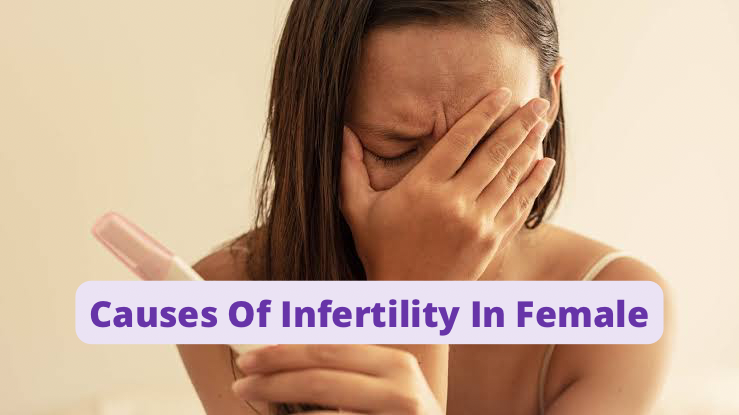Causes Of Infertility In Females

Infertility is defined as the inability to conceive after trying for at least one year. It is a common problem that affects approximately 15% of couples trying to have a child. We will focus on the causes of infertility in women. There are many potential causes of infertility in women, and sometimes the cause is unknown. Here are some common causes.
1. Ovulation Disorder
Ovulation is the process of releasing an egg from the ovary. If a woman is not ovulating, she will not be able to get pregnant. Ovulation disorders can be caused by hormonal imbalances, such as high levels of prolactin or low levels of estrogen. Polycystic ovary syndrome (PCOS) is a common condition that can cause ovulation disorders.
2. Cervical Mucus Problems
When you’re ovulating, mucus in your cervix becomes thinner so sperm can swim through it more easily. If there’s a problem with the mucus, it can make it harder to conceive.
Cervical mucus issues can hinder sperm from reaching the uterus, but they are rarely the main reason for infertility. Cervical mucous issues are typically not a major contributor to infertility, it can only make it harder for one to conceive.
3. Pelvic Inflammatory Disease
The womb, fallopian tubes, and ovaries are all included in the upper female genital system, when infected by pelvic inflammatory disease (PID) which is a s*xually transmitted infection (STI). PID can scare and injure the fallopian tubes, effectively preventing an egg from entering the womb.
If the tubes are damaged or blocked, the egg cannot reach the uterus and fertilization cannot occur.
4. Fibroid
Uterine fibroids are noncancerous tumor muscle tissues in the womb. Infertility may result from uterine fibroids blocking the fallopian tubes or preventing a fertilized egg from implanting in the uterus. A fetus may also be prevented from growing fully as a result of big fibroids taking up more uterine room.
Some causes of fibroid includes deficiency of vitamin D, drinking alcohol, obesity or even birth control pills or methods.
5. Endometriosis
Endometriosis develops when the uterine lining cells begin to proliferate or spread in areas where they shouldn’t, such the ovaries or fallopian tubes. These growths may interfere with your ability to conceive by blocking your fallopian tubes, which are the channels through which egg cells pass to reach the uterus, or by causing scar tissue to form.
It should be known that a painful period might be a result of endometriosis. Ladies should always get checked to know the cause of the pain that comes with their menstrual cycle.
6. Life And Lifestyle
Female fertility begins to decline in the late 20s and early 30s, and decreases rapidly after the age of 35. As a woman gets older, the number and quality of her eggs decline, making it more difficult to get pregnant.
Certain lifestyle factors can contribute to fertility problems. These include being overweight or obese, smoking, excessive alcohol consumption, and using certain medications.
7. Immunological Issues
Immunological issues refer to problems with the immune system that can affect fertility. In some cases, the immune system may mistakenly attack the sperm, which can make it difficult for a woman to get pregnant. This can occur if the immune system produces antibodies that attack the sperm, or if certain immune cells called leukocytes (white blood cells) are present in the s£men.
There are several types of immunological issues that can affect fertility, including:
• Antisperm antibodies: These are proteins produced by the immune system that attack the sperm, either on the surface of the sperm or after the sperm has entered the egg. This can make it difficult for the sperm to fertilize the egg.
• Sperm-leukocyte immunological infertility: This occurs when leukocytes (white blood cells) are present in the s£men. The presence of leukocytes can indicate inflammation or infection in the reproductive system, which can affect fertility.
• Natural killer cell infertility: Natural killer cells are a type of immune cell that can attack the sperm or the fertilized egg.
• Luteal phase defect: This is a condition in which the immune system attacks the lining of the uterus (endometrium), which can prevent implantation of a fertilized egg.
It’s important to note that these are just some of the potential causes of infertility in women, and it’s possible for there to be other underlying causes as well. If you’re experiencing fertility issues, it’s important to speak with a healthcare provider to determine the cause and discuss potential treatment options.
Read also: Causes Of Infertility In Men.







